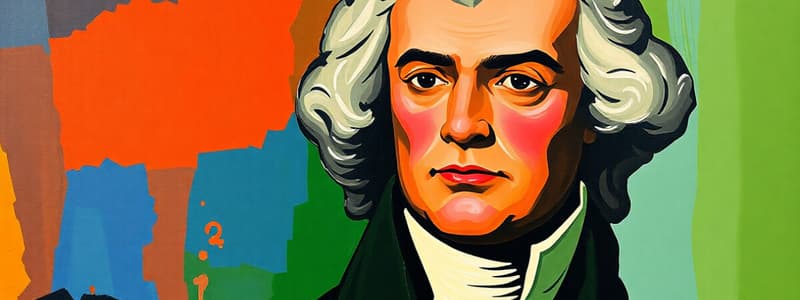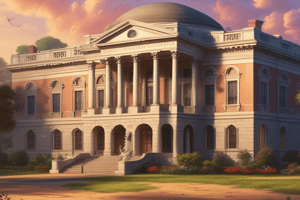Podcast
Questions and Answers
What was a key event that marked a turning point in American politics during Jefferson's presidency?
What was a key event that marked a turning point in American politics during Jefferson's presidency?
- The inauguration of Thomas Jefferson (correct)
- The War of 1812
- The signing of the Declaration of Independence
- The establishment of the Constitution
Which policy did Jefferson's administration enact to reduce the national debt?
Which policy did Jefferson's administration enact to reduce the national debt?
- Increasing military expenditures
- Repealing internal taxes (correct)
- Raising income taxes
- Eliminating the Bank of the United States
How did Jefferson approach the Federalist elements that were still in place after his election?
How did Jefferson approach the Federalist elements that were still in place after his election?
- He systematically replaced all Federalist officeholders.
- He ignored the Federalists altogether.
- He abolished all Federalist policies immediately.
- He maintained many Federalist policies and filled vacancies with supporters. (correct)
What was a major outcome of the Embargo Act between 1807 and 1809?
What was a major outcome of the Embargo Act between 1807 and 1809?
What was the significance of the Judiciary Act of 1801?
What was the significance of the Judiciary Act of 1801?
Which act replaced the Embargo Act in 1809?
Which act replaced the Embargo Act in 1809?
What aspect of government spending did Jefferson and Gallatin particularly seek to reduce?
What aspect of government spending did Jefferson and Gallatin particularly seek to reduce?
What outcome did Jefferson's policies have in the early years of his administration?
What outcome did Jefferson's policies have in the early years of his administration?
What loophole did American captains exploit during the Embargo Act?
What loophole did American captains exploit during the Embargo Act?
What was one of the key reasons Madison did not want to engage in the European war?
What was one of the key reasons Madison did not want to engage in the European war?
What was one reason for the growing sectional tensions related to slavery during Jefferson's presidency?
What was one reason for the growing sectional tensions related to slavery during Jefferson's presidency?
What was the primary intention of Macon's Bill No. 2?
What was the primary intention of Macon's Bill No. 2?
Which court case is associated with Jefferson's efforts to assert judicial power during his administration?
Which court case is associated with Jefferson's efforts to assert judicial power during his administration?
What role did Albert Gallatin play in Jefferson's administration?
What role did Albert Gallatin play in Jefferson's administration?
What was a direct response from Congress to Napoleon's promise regarding French restrictions?
What was a direct response from Congress to Napoleon's promise regarding French restrictions?
What significant event involved Native Americans in 1809?
What significant event involved Native Americans in 1809?
What factor contributed to the public's dissatisfaction with the Embargo Act?
What factor contributed to the public's dissatisfaction with the Embargo Act?
Which two nations were excluded from trade under the Non-Intercourse Act?
Which two nations were excluded from trade under the Non-Intercourse Act?
What was a common method used by American merchants during the Embargo period?
What was a common method used by American merchants during the Embargo period?
What consequence did the peace treaty have regarding the issues that led to the war?
What consequence did the peace treaty have regarding the issues that led to the war?
What was the major political impact in New England following the war?
What was the major political impact in New England following the war?
What was John Quincy Adams's role in the Treaty of Ghent?
What was John Quincy Adams's role in the Treaty of Ghent?
Which crisis led to increased compensation for New England during the war?
Which crisis led to increased compensation for New England during the war?
How was the Federalist convention in Hartford viewed after the war concluded?
How was the Federalist convention in Hartford viewed after the war concluded?
What event is marked by the signing of the Treaty of Ghent?
What event is marked by the signing of the Treaty of Ghent?
What was the main dispute leading to the War of 1812?
What was the main dispute leading to the War of 1812?
Which factor initially made the British consider the war with the United States a lesser priority?
Which factor initially made the British consider the war with the United States a lesser priority?
Who led the American army that surrendered in Canada?
Who led the American army that surrendered in Canada?
What was a significant consequence of Tecumseh's death at the Battle of the Thames?
What was a significant consequence of Tecumseh's death at the Battle of the Thames?
What was the outcome of the American campaign to capture Canada during the War of 1812?
What was the outcome of the American campaign to capture Canada during the War of 1812?
What was one of the American victories at Lake Erie attributed to?
What was one of the American victories at Lake Erie attributed to?
What was the composition of the small U.S. army at the beginning of the War of 1812?
What was the composition of the small U.S. army at the beginning of the War of 1812?
What event is often associated with Oliver Hazard Perry's victory statement?
What event is often associated with Oliver Hazard Perry's victory statement?
What did the British gain from their initial engagement with Native Americans during the war?
What did the British gain from their initial engagement with Native Americans during the war?
What conclusion can be drawn about the U.S. military strategy at the start of the War of 1812?
What conclusion can be drawn about the U.S. military strategy at the start of the War of 1812?
What event prompted Napoleon's abdication and subsequent exile?
What event prompted Napoleon's abdication and subsequent exile?
What was the main objective of the British fleet after landing at Bladensburg?
What was the main objective of the British fleet after landing at Bladensburg?
Who was able to negotiate on behalf of a civilian prisoner during the bombardment of Fort McHenry?
Who was able to negotiate on behalf of a civilian prisoner during the bombardment of Fort McHenry?
What did Dolley Madison manage to save from the presidential home before fleeing?
What did Dolley Madison manage to save from the presidential home before fleeing?
What was the significance of the Battle of New Orleans?
What was the significance of the Battle of New Orleans?
What tactic did Andrew Jackson employ during the Battle of New Orleans?
What tactic did Andrew Jackson employ during the Battle of New Orleans?
Which American commander secured a victory at Plattsburgh?
Which American commander secured a victory at Plattsburgh?
What was burned by the British in retaliation during their capture of Washington, D.C.?
What was burned by the British in retaliation during their capture of Washington, D.C.?
Which event contributed to the British planning a major offensive at New Orleans?
Which event contributed to the British planning a major offensive at New Orleans?
What was the outcome of the British bombardment of Fort McHenry?
What was the outcome of the British bombardment of Fort McHenry?
Flashcards are hidden until you start studying
Study Notes
Jefferson's First Term
- Thomas Jefferson's inauguration in 1801 marked a shift toward Republican leadership, leading to a period of Republican dominance.
- The Federalists weakened as a political force, though their ideology continued to influence Supreme Court decisions.
- The Louisiana Purchase in 1803 doubled the size of the United States, facilitating the admission of eight new states (1803–1821).
- The entrance of Maine and Missouri brought slavery to the forefront of national debate, setting the stage for future sectional conflicts.
- Jefferson's administration focused on reducing the national debt, with Secretary of the Treasury Albert Gallatin implementing policies that cut military spending and internal taxes.
- The repeal of internal taxes, including the excise tax on whiskey, contributed to a modest decline in national debt.
- Jefferson maintained essential Federalist structures, such as the Bank of the United States, while reforming the political landscape by appointing Republicans to key positions as vacancies arose.
- The Marbury v. Madison case established the principle of judicial review, asserting the judiciary's role in interpreting laws.
- The Embargo Act of 1807 aimed to prevent American ships from trading with hostile nations, leading to increased domestic manufacturing despite widespread discontent.
Neutrality under Jefferson and Madison
- James Madison succeeded Jefferson, committed to maintaining American neutrality in European conflicts.
- The Non-Intercourse Act of 1809 replaced the Embargo Act, allowing trade with all nations except Britain and France.
- Congress passed Macon's Bill No. 2 in 1810, attempting to negotiate with France and Britain regarding neutral shipping rights.
- Native American opposition to American expansion intensified, with tribes being coerced into land agreements, such as the Treaty of Fort Wayne (1809).
War of 1812
- The war originated from issues over maritime freedom but was primarily fought on land.
- Madison perceived British policies as aimed at diminishing U.S. maritime competition while Britain viewed the war as secondary to its conflict with France.
- American strategies targeted Canada, but poor military leadership and alliances with Native Americans hindered progress.
- General William Hull's surrender at Detroit was a significant early defeat for the U.S.
- The U.S. achieved success on Lake Erie with Oliver Hazard Perry's naval victory on September 10, 1813.
- William Henry Harrison's victory at the Battle of the Thames resulted in the death of Tecumseh, undermining Native American resistance.
- The British regained initiative in 1814 after Napoleon's abdication, launching successful attacks, including the burning of Washington, D.C.
- Francis Scott Key composed "The Star-Spangled Banner" during the British bombardment of Fort McHenry.
- The decisive American victory at the Battle of New Orleans (January 8, 1815) occurred after a peace treaty had already been signed, making Andrew Jackson a national hero.
Ending the War
- The Treaty of Ghent was signed on December 24, 1814, effectively ending the war without addressing key issues like impressment and trade rights.
- Federalists attempted to regain political influence during the war; however, their call for constitutional amendments in response to perceived government overreach was poorly timed.
- Discontent in New England over the war's economic impacts contrasted with local profits from trade, complicating regional political dynamics.
- The Federalist convention in Hartford proposed measures to limit federal power but lost credibility as the war concluded.
Studying That Suits You
Use AI to generate personalized quizzes and flashcards to suit your learning preferences.




